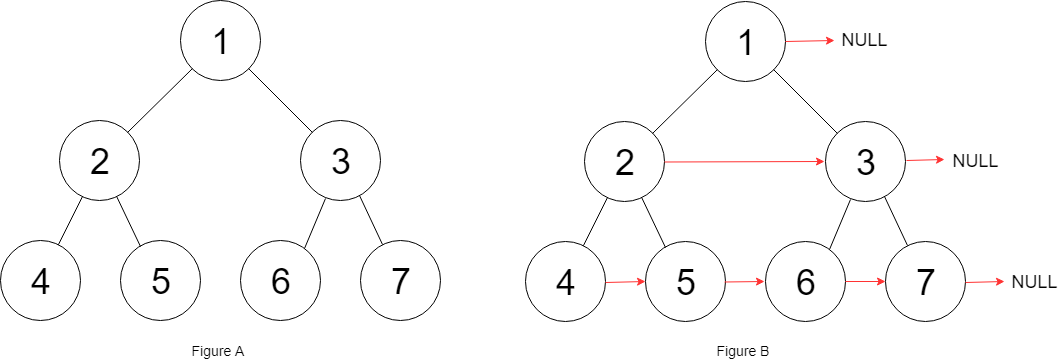Populating Next Right Pointers in Each Node
Created: February 26, 2020 by [lek-tin]
Last updated: February 26, 2020
You are given a perfect binary tree where all leaves are on the same level, and every parent has two children. The binary tree has the following definition:
struct Node {
int val;
Node *left;
Node *right;
Node *next;
}
Populate each next pointer to point to its next right node. If there is no next right node, the next pointer should be set to NULL.
Initially, all next pointers are set to NULL.
Follow up
- You may only use constant extra space.
- Recursive approach is fine, you may assume implicit stack space does not count as extra space for this problem.
Example 1

Input: root = [1,2,3,4,5,6,7]
Output: [1,#,2,3,#,4,5,6,7,#]
Explanation: Given the above perfect binary tree (Figure A), your function should populate each next pointer to point to its next right node, just like in Figure B. The serialized output is in level order as connected by the next pointers, with '#' signifying the end of each level.
Constraints
- The number of nodes in the given tree is less than
4096. -1000 <= node.val <= 1000
Solution 1 (bfs / level by level)
Time: O(n)
Space: O(n)
"""
# Definition for a Node.
class Node:
def __init__(self, val: int = 0, left: 'Node' = None, right: 'Node' = None, next: 'Node' = None):
self.val = val
self.left = left
self.right = right
self.next = next
"""
from collections import deque
class Solution:
def connect(self, root: 'Node') -> 'Node':
if not root:
return root
queue = deque([root])
while len(queue):
size = len(queue)
for i in range(size):
node = queue.popleft()
if i < size-1:
node.next = queue[0]
if node.left:
queue.append(node.left)
if node.right:
queue.append(node.right)
return root
Solution 2 (recursion)
Time: O(n)
Space: O(1) or O(logN) if implicit stack space counted.
"""
# Definition for a Node.
class Node:
def __init__(self, val: int = 0, left: 'Node' = None, right: 'Node' = None, next: 'Node' = None):
self.val = val
self.left = left
self.right = right
self.next = next
"""
class Solution:
def connect(self, root: 'Node') -> 'Node':
if not root or not root.left:
return root
root.left.next = root.right
if root.next:
root.right.next = root.next.left
self.connect(root.left)
self.connect(root.right)
return root
Solution 3 (constant space)
We can use previously constructed next pointers to reduce space to constant
Time: O(n)
Space: O(1)
"""
# Definition for a Node.
class Node:
def __init__(self, val: int = 0, left: 'Node' = None, right: 'Node' = None, next: 'Node' = None):
self.val = val
self.left = left
self.right = right
self.next = next
"""
from collections import deque
class Solution:
def connect(self, root: 'Node') -> 'Node':
if not root:
return root
leftmost = root
while leftmost.left:
curr = leftmost
while curr:
curr.left.next = curr.right
if curr.next:
curr.right.next = curr.next.left
curr = curr.next
leftmost = leftmost.left
return root